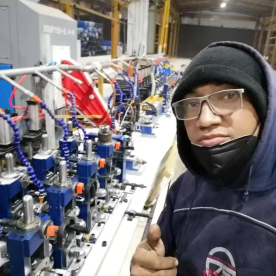[Flying Saw Machine for Pipe Cutting]Flying Saw Machine for Pipe Cutting: Revolutionizing Efficiency and Precision in Manufacturing Processes
News 2024-9-10
In the ever-evolving landscape of manufacturing and industrial processes, efficiency and precision have become paramount. The advent of advanced machinery has significantly transformed traditional methods of production, and one such innovation that stands out is the Flying Saw Machine for Pipe Cutting. This cutting-edge technology is not just a tool; it's a game-changer that optimizes the process of cutting pipes with remarkable accuracy and speed.

Flying Saw Machine for Pipe Cutting: Revolutionizing Efficiency and Precision in Manufacturing Processes
One of the key advantages of the Flying Saw Machine is its ability to operate autonomously and remotely, which significantly reduces the need for manual labor. By integrating automated systems, such as computer numerical control (CNC), manufacturers can program the machine to perform precise cuts according to specified dimensions. This level of automation not only boosts production rates but also reduces the likelihood of human error. Consequently, manufacturers can maintain high standards in their product quality while streamlining operations.
Moreover, the versatility of flying saw machines makes them suitable for a diverse range of applications across various industries. For instance, in the construction sector, these machines are invaluable for accurately cutting pipes used in plumbing and HVAC systems. In the automotive industry, flying saws facilitate the fabrication of piping for exhaust systems and fuel lines, ensuring that parts fit seamlessly together. Their capability to handle different materials further broadens their usability, making them indispensable in sectors such as oil and gas, water treatment, and manufacturing of industrial machinery.
Another significant benefit of using a Flying Saw Machine for pipe cutting is its impact on safety. Traditional cutting methods can pose various hazards to operators, especially when dealing with high-speed rotational blades. However, the design of flying saws incorporates various safety features, such as blade guards and automatic shut-off systems, that reduce the risk of accidents. These advancements have led to safer working environments, allowing operators to work with peace of mind as they oversee automated processes.
Cost-effectiveness is another crucial factor that makes flying saw technology appealing to manufacturers. Although the initial investment cost may be higher than that of conventional cutting machines, the long-term savings manifest through reduced labor costs, enhanced operational efficiency, and minimal waste generation. By optimizing the cutting process, businesses can lower overhead costs while achieving greater profit margins. Furthermore, the longer lifespan and durability of flying saw machines mean that they require less frequent replacements or repairs, contributing further to cost savings over time.

Flying Saw Machine for Pipe Cutting: Revolutionizing Efficiency and Precision in Manufacturing Processes

Flying Saw Machine for Pipe Cutting: Revolutionizing Efficiency and Precision in Manufacturing Processes
In conclusion, the Flying Saw Machine for Pipe Cutting represents a transformative leap in industrial cutting technology. With its ability to deliver precision cuts, enhance safety, and boost productivity, it is establishing itself as an essential tool in the modern manufacturing landscape. As industries continue to demand greater efficiency and quality, the adoption of flying saw machines is likely to grow, propelling businesses towards a more innovative and competitive future. Those who embrace this technology will undoubtedly find themselves at the forefront of industry advancements, ensuring their place in a rapidly evolving market.
